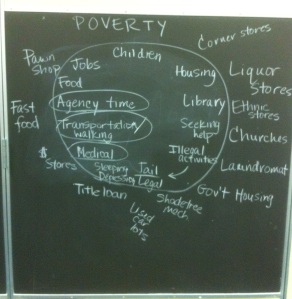Several weeks ago, we began a series entitled “The Church and Poverty,” aimed at educating the church about the hidden side and secret facts of poverty, something that far too few Christians are prepared to engage.
We ended with two series of two questions:
1.) What do people in poverty do with their time? What types of businesses do you see in communities of poverty?
2.) What do people in the middle class do with their time? What types of businesses do you see in middle class communities?
Here are our answers from that first class. The inner circle represents the group’s perceptions of how those in poverty spend their time. The outer circle represents what our group sees when they are in communities and neighborhoods of poverty.
As we discussed our perceptions, we learned about the layers of poverty and how poverty is frequently a system that traps people.
As we discussed transportation issues, we learned that riding a bus can take 60-90 minutes to travel a distance that would take 10-15 minutes if you traveled by car.
As we learned about the time that is spent securing food stamps, welfare, and other forms of aid, we learned about the great time restrictions that exist here.
Factoring in travel time and time spent with various assistance agencies, it quickly becomes difficult to have time to work 40 hours a week, and without working at least 40 hours a week, it becomes difficult to feed and care for your family.
So what do you choose? Do you go to work in hopes that, at a low-wage pace, you’ll eventually be able to build up an income that will be suitable to care for your family? Or do you skip work to secure aid, with the knowledge that at least you’ll be able to feed your family for a few more weeks?
In poverty, time is spent putting out today’s fires and caring for today’s needs. There is little to no consideration for the future, which leads to a lack of effort in education when you’re younger, which puts you behind the 8 ball when you’re older, which traps you in the cycle of poverty.
This also explains a lack of long-term financial planning. How can you plan for the future, when today seems impossible? Financial planning is truly a tool of the middle and upper class.
Our discussion boiled down to two points:
1.) Poverty focuses on relationships, friendships, caring for your neighbor (even at your own expense, financially and otherwise).
2.) The middle class focuses on ownership and achievement. From soccer at age 4 to academics in school, from business and financial success to newer cars and bigger houses, the focus is on success and achievement.
Now…which one looks more like the biblical church? Certainly, individuals in poverty could love from those in middle class: financial planning and management, the value of education, etc. We must realize, however, the opposite also rings true.
When the people around you have few material possessions, you are forced to define their worth in a different way. A person becomes valuable for who they are and not what they own.
Those in poverty do not need to learn from the middle class. We all need to learn from each other, and in some way, the church will come to life.


